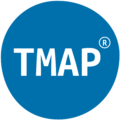About Us
TMAP® is the body of knowledge for quality engineering and testing in IT delivery. TMAP® is fully aligned with IT delivery models based on the Agile mindset, such as Scrum, DevOps and SAFe®. TMAP® was initiated in 1995 and back then mainly contained a process description for testing. Over the years, TMAP® has evolved from process-driven, business-driven and human-driven to a value-driven body of knowledge with which quality assurance & testing activities can be integrated in all IT delivery models. The body of knowledge contains a wide range of approaches, good practices, techniques and tools for organizing and performing activities related to quality engineering and testing of IT systems.
Among the many important features of TMAP® are:
1. the VOICE-model that aligns the concept of business value with the objectives of IT delivery.
2. The QA Testing topics that describe generic activities related to organizing IT delivery and performing IT delivery
3. The test design approaches (divided in experience based testing and coverage based testing) and the test design techniques (categorized by process-oriented, condition- oriented, data-oriented and appearance-oriented).
The TMAP is no longer just an abbreviation but a brand name. TMAP has evolved beyond its original acronym for Test Management Approach, embodying a brand that represents excellence, proficiency, and forward-thinking in IT practices.
Together with the launch of the book ‘TMAP: Quality for DevOps Teams’” (by Rik Marselis, Berend van Veenendaal, Dennis Geurts and Wouter Ruigrok (ISBN 978-90-75414-89-9)), Sogeti and iSQI introduced the renewed TMAP® certification scheme.
This consists of three training courses and certifications that focus on various audiences. For example, Developers, Operations people, Business analysts, Testers, Product Owners, Scrum Masters, Users and other roles within high-performance IT delivery.
Certification scheme
Currently the TMAP certification scheme offers four modules:
-
-
-
TMAP: Organizing Built-In Quality At Scale
-
TMAP: Quality Engineering for SAP
- TMAP: Quality for Cross-Functional Teams
- TMAP: High-Performance Quality Engineering
- TMAP: Organizing Built-In Quality At Scale
- TMAP: Quality Engineering for SAP
Pre-conditions
For these training courses, basic knowledge of information technology, working in teams and an Agile way of working are required.
There are no specific certifications required.
Exams Certification:
All participants receive a certification of attendance and prepare for taking the certification exam.
Exam:
The exam is no longer than1.5 hours with no more than 40 questions.“ explain that by QCFT is 30 questions, 1 hour , PERF and ORGN 40 questions, 1,5 hours and SAP 25 questions – 1 hour.
TMAP® website
The TMAP® body of knowledge can be found at www.TMAP.net.
